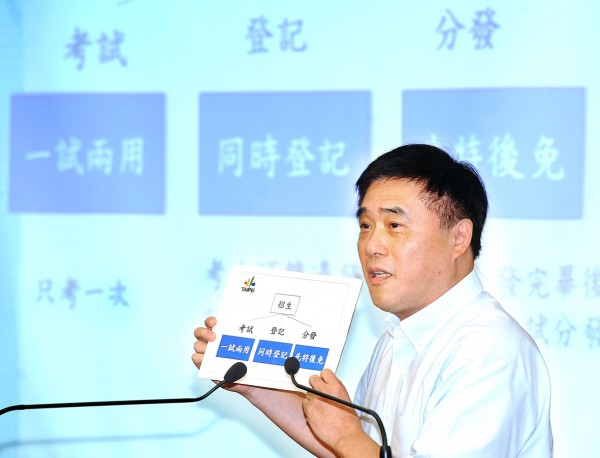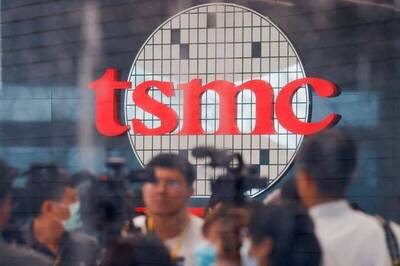《TAIPEI TIMES 焦點》Taipei to hold only one exam: Hau

Taipei Mayor Hau Lung-bin holds up a graphic clarifying how the city will handle student enrollment at a press conference in Taipei yesterday. Photo: Fang Pin-chao, Taipei Times
By Hsieh Chia-chun / Staff reporter
Taipei Mayor Hau Lung-bin (郝龍斌) yesterday said the city will only hold one high-school admission exam next year, whose results can be used for both the special enrollment program and the exam-free admission program.
“The city has set three principles for next year’s high-school admission: that Comprehensive Assessment Program [CAP] scores be used for both the special enrollment program and the examination-free program; that students be allowed to apply to the two enrollment programs at the same time; and that the special enrollment program be held before the examination-free one,” Hau told a press conference.
The city government’s aim is to shorten the lengthy school admission process under the current 12-year national education system to give students a fairer system and allow them to enjoy their summer vacation, Hau said.
Under the current system, the exam-free admission program, which offers 75 percent of the total enrollment slots, is held before the special enrollment program, which provides the remaining 25 percent admission quotas.
Students who aspire to be assigned to high schools through the two-stage exam-free program are required to take the CAP for Junior-High School Students in May, which quizzes students on five academic subjects. They are assessed based on their CAP scores and their performances in non-academic areas.
Those who fail to be picked by their preferred schools in the first stage can compete for the remaining exam-free slots in the second stage, which is generally held in August.
Students wishing to be assigned via the special enrollment program can join either the program’s screening-based admission, which requires them to be tested in April for competence in their chosen specialty — such as art, music, dance or sports — or its application-based admission, which requires applicants to undergo an academic competence test in July.
That means students who want to join both enrollment programs have to take two academic ability tests and may have to wait until August to know which schools they end up in.
Hau said he made the decision after deliberating the matter with education professionals and parent organizations. That includes deciding not to follow the steps of New Taipei City Mayor Eric Chu (朱立倫), who on Thursday announced that his city would drop the special enrollment program next year.
Taipei City Department of Education Director Lin Yi-hua (林奕華) said the Research Center for Psychological and Educational Testing at National Taiwan Normal University, which is in charge of setting the examination questions for the two academic tests, has confirmed the feasibility of combining the two tests into one.
“We have submitted our proposal to the Ministry of Education for assessment and it is due to be deliberated at a national education conference,” Lin said.
As for Taipei’s plan to move the special enrollment program before the exam-free admission program, the city government’s Department of Legal Affairs director, Tsai Li-wen (蔡立文), said the plan does not run counter to the principle of “exam-free first, special enrollment later” stipulated in the Senior High School Education Act (高級中等教育法) because at present, the second-stage of exam-free admission is also held after the special enrollment program.
In response, Minister of Education Wu Si-hua (吳思華) said the ministry would adhere to the principle of “exam-free first, special enrollment later” because it gives 80 percent of students a wider range of specializations and only 20 percent to be academic-centered.
“We do not want to also put the 80 percent [under the pressure] of academic exams,” Wu added.
(Additional reporting by Rachel Lin)
新聞來源:TAIPEI TIMES



















